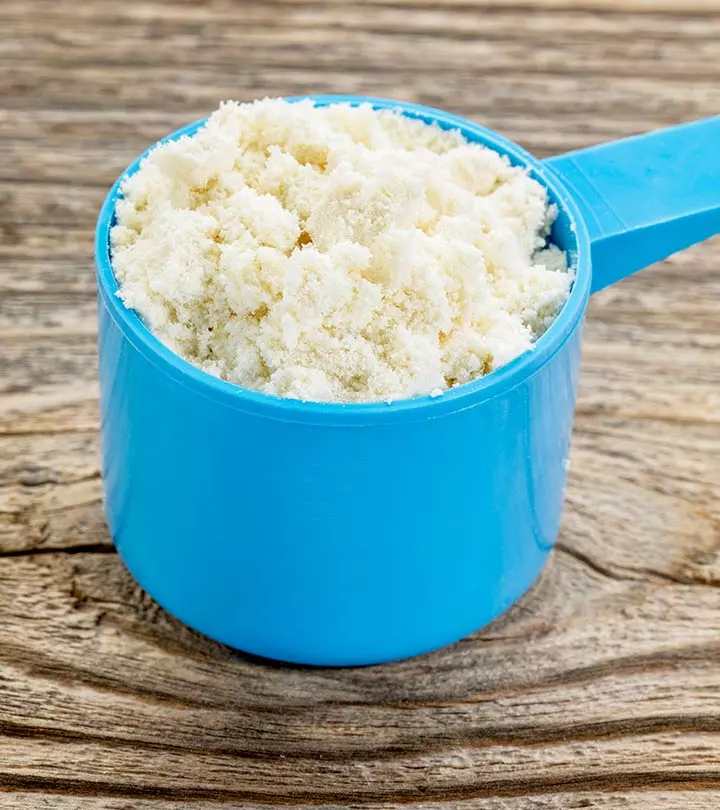15 Side Effects Of Whey Protein You Should Be Aware Of
While this dietary supplement may be beneficial for your health, beware of its ill effects too.

Image: StyleCraze Design Team
Whey protein is commonly used as a supplement to build muscles and keep your cholesterol levels under control. While the benefits of whey are many, a lot of people do not know about the several side effects of whey protein on your health. It’s important to be aware of whey protein’s potential side effects before adding it to your diet. This knowledge allows you to make better decisions about whether or not this supplement aligns with your health needs and goals. Take a look!
 Know The Flip Side: Whey Protein
Know The Flip Side: Whey ProteinShort-Term Effects
Fatigue, weakness, fat gain, bloating, gas, constipation, digestive issues, wheezing, swelling of the throat or mouth, and nausea.
Long-Term Effects
Kidney stone formation, abnormal heart rhythms, cardiac arrest, worsen liver issues, and osteoporosis.
Drug Interactions
It may interact with Parkinson’s disease, osteoporosis, anti-platelet, anti-coagulants, non-steroidal anti-inflammatory drugs.
When To See A Doctor
If you experience an allergic reaction, aggravation of an existing liver condition, severe discomfort, stomach pain, or nausea.
In This Article
Whey Protein – A Brief

Although whey protein is considered to be a supplement that is safe, it is best not to go overboard with it. When you consume it more than you should, it can lead to a number of health problems. This risk is even higher when your intake of carbohydrates is low. Milk contains two types of protein; one of them is whey protein. It is water soluble and is used to meet the daily protein requirements. It also provides large amounts of L-cysteine, the amino acid. This amino acid helps in the alleviation of deficiencies that come with conditions such as diabetes aging (1).
Experts call whey protein the “complete protein” as it is rich in all the amino acids required by the human body to repair muscles, bones, tissues, organs, etc. Other complete proteins are foods such as eggs, meat, dairy, etc. One of the pros of whey protein is that it is easy to digest quickly (2).
 Did You Know?
Did You Know?Key Takeaways
- Whey protein helps in boosting the immune system and lowering cholesterol levels.
- Excess consumption of whey protein may increase your weight and cause digestive problems and acne.
- Consuming too much of whey protein may increase the risk of gout and cardiovascular diseases.
- Whey protein supplements may interact with certain antibiotics and blood sugar medications.

Interesting Facts About Whey Protein
Whey protein has several intriguing characteristics. First, it is a byproduct of cheese production, making it a sustainable and eco-friendly protein source. It also contains bioactive peptides which are known for their potential health benefits, such as blood pressure regulation and antioxidant properties (3). However, more research is needed on the same.
Consuming whey protein can help control one’s appetite by promoting a sense of fullness. This makes it an excellent choice for weight management and curbing overeating (4). Moreover, whey protein isolate contains even fewer fats and carbohydrates than whey protein concentrate, which makes it a nearly pure source of protein. This is why it is used in protein shakes and bars.
Overall, it is a valuable nutritional resource that offers a diverse range of health benefits. Learn more about them below.
Benefits Of Whey Protein
Although whey protein is consumed as a supplement, it is much more than that. It is a functional “super food” that helps immensely in the regulation of your body weight. It also helps in increasing muscle mass, and comes with many other health benefits. Whey protein benefits are linked directly to its amino acid profile. This complete protein is also highly rich in antioxidants, making it an effective fighter against various diseases and a great promoter of overall health (5).
Here is a look at some of the benefits that you can gain by moderately consuming whey protein supplement of high quality on a regular basis (5):
- It helps in promoting weight loss.
- It helps in increasing muscle mass in the body.
- It helps in the treatment of cancer.
- It helps in reducing the symptoms that come with HIV.
- It helps in increasing the levels of glutathionei An antioxidant compound essential for the proper functioning of the immune system and for building and repairing tissues. in your body.
- It helps in lowering triglyceridei A kind of lipid or fat formed from the conversion of extra calories that the body doesn’t use right away. levels in the body.
- It helps in lowering cholesterol levels while increasing good cholesterol or HDL.
- It helps in boosting the proper function of the immune system.
- It helps in increasing power while playing sports.
- It helps in lowering recovery time and the symptoms that come with over-training.
As you can see, there are quite a few benefits to gain from whey protein intake. The trick is to make sure that you do not take too much of it. Instead of gaining its goodness, you can end up with side effects that may not seem too severe but can be highly uncomfortable. If you have kidney, liver or heart problems, it is especially important to moderate your intake of whey protein and also get your doctor’s advice before you start making it a part of your daily diet.
When Should One Take Whey Protein?

This is a question that is often asked by many people who are interested in consuming whey protein but do not know how to go about it properly. It is not tough to learn when to take this protein to reap its benefits.
Firstly, if you want to take whey protein on its own, you should do it within half an hour to an hour after a workout that is based on strength training. This is because this protein gets digested very quickly. During other times, you should eat it with other foods so that digestion can be slowed down. For instance, for extra protein in your breakfast without foods like eggs, you can add whey protein to your oats in powder form.
Secondly, if you want to have a healthy snack while you are in the office, you can have a whey protein-shake combined with a bit of fish oil or nuts. This again will help in slowing down the digestion process of the protein. The fat combination is what helps slow down digestion and this in turn benefits you greatly by allowing the levels of insulin in your body to stay even. It also aids in the stimulation of CCK, which is a hormone that lets your body know when it is full.
Protein that is digested after a workout gives your body the amino acids that it needs for the repairing and building of new muscles. According to experts, consuming whey protein as soon as you complete a workout could be especially beneficial as it has a rich content of Leucine, an amino acid that is easily absorbed by the body.
Whey Protein Side Effects
Although whey protein has many benefits, it does come with quite a few side effects as well. So, is whey protein good for you? To understand it in more detail, take a look at fifteen of the adverse effects that this protein can have on your body.
1. Excessive Fat Gain
In many cases, whey protein supplements have extra carbohydrates in the form of sugars. While some have very little sugar, others can have up to 23 grams per scoop. If you mix them with milk, this can create a drink that packs over 1,200 calories. The problem with this is that it could lead to weight gain and cause your blood sugar to spike (8). There are some that have fats as well. This means that weight can be gained in fat form, which is unhealthy. You can also gain weight when you overeat while consuming whey protein at the same time.
2. Kidney Stone Formation
Kidney stone formation is a possible side effect of protein supplements. The recommended protein intake for adults is between 0.8 and 1.0 grams per kilogram of body weight per day. Some studies found no link between protein intake and kidney stones, while others suggested that high-protein diets might lead to more calcium in the urine, which can increase the risk of stones. Interestingly, some studies suggest that it is not just protein intake that matters, but the overall acid load from food. A higher acid load, resulting from eating more protein, may increase the risk of stones. On the other hand, eating more fruits and vegetables, which help neutralize the acidity of protein, may lower the risk of stone formation (9).
So, when you consume whey protein, there may be a risk of kidney stone formation. While it may not be a direct cause, experts believe that this protein can make the condition worse if you are already suffering from it. To prevent this, you should take adequate quantities of dietary fiber and water.
A blogger began dealing with back pain after taking whey protein supplements in high school to build muscle. Their personal trainer attributed it to potential kidney problems due to inadequate water consumption while using the protein. The blogger wrote, “Ultimately, it’s noted that whey protein could possibly be linked to kidney pea gravel. If you have back pain, stop taking whey protein until the pain subsides (i).”
3. Digestive Problems

Lactose is present in whey protein, and if you are sensitive to it, you could end up having problems with digestion. It is not only people who are lactose intolerant that suffer from this problem. If you do have digestive problems, opt for a whey protein concentrate as it does not contain as much lactose. Whey protein isolate, which is more refined, can deplete good bacteria in your gut and might cause digestive issues such as constipation, gas, bloating, and stomach pain (8), (11).
[ Read: Side Effects Of Soy Proteins ]
4. Risk Of Gout
Although there is no evidence that whey protein is a direct cause of gout, it can worsen the problem if you already have it. It is also best to consult a physician before you start taking whey protein if there is a history of gout in your family.
5. Kidney Problems
Excessive intake of whey protein can cause renal problems, especially if you already suffer from them (11). Experts recommend monitoring your whey protein intake and also consulting your physician before you start taking it. This way you can avoid any long-term kidney damage.
A recent systematic review published in the Applied Physiology, Nutrition, and Metabolism journal examined the potentially harmful effects of excessive whey protein supplementation, focusing on studies from various databases. While whey protein is known for its benefits, chronic and abusive intake, especially without professional guidance, can lead to adverse effects, particularly on the kidneys and liver. Other side effects linked to overconsumption include increased aggression, acne, and changes in gut bacteria (11). More research is needed to understand the effects of different types of whey protein on physical health, particularly with or without exercise.
6. Liver Problems
Consuming whey protein excessively can worsen liver problems. A case study published in the Seminars in Liver Disease journal mentions a healthy 27-year-old man who developed liver issues, including jaundice, after taking creatine and whey protein supplements. Despite having no history of alcohol use, medications, or chemical exposure, his blood tests showed signs of liver damage, and a liver biopsy confirmed the injury. After stopping the supplements and receiving treatment, his condition improved rapidly (12).
This is why it is important to make sure that you consume the protein moderately at all times. It is also advisable to consult your doctor before taking whey protein, as it may interfere with the effects of the medication you are taking for your liver condition.
7. Risk Of Heart Disease
Experts believe that consuming too much whey protein can have dangerous effects on people who suffer from heart disease. It can cause cardiac arrest, high blood pressure, heart palpitations that are abnormal, and as well as complete loss of heart functionalities. This may be due to high protein consumption. Research suggests that high-protein diets may increase the risk of heart disease by promoting atherosclerosis, which is plaque buildup in arteries that may restrict blood flow and increase the likelihood of heart attacks or strokes. It shows that consuming protein raises amino acid levels in the blood, which activates immune cells called macrophages and triggers a process that worsens plaque formation. High protein also makes these cells more prone to death in response to harmful fats, disrupting their ability to clear damaged parts and leading to cell dysfunction (13). This means excessive protein intake, including whey protein, may negatively affect heart health.
8. Blood Acidity Increase
Another side effect of whey protein consumption is an escalation of pH in blood. When there is too much protein in your blood, the kidney has problems in metabolizing it. This results in an increase of blood acidity. The condition is known as metabolic acidosis. When it occurs, the body tries to balance things out by making certain substances like angiotensin II that may cause blood vessels to tighten and may increase blood pressure. At the same time, the body starts to produce more ammonia to help get rid of the extra acid. However, all these processes may lead to inflammation and scarring (14).
9. Development Of Osteoporosis
This disorder has been linked to excessive intake of whey protein. This is especially risky and causes joint pain with long-term intake of the protein. Consuming whey protein in high amounts can cause mineral imbalance in the bones which in turn can lead to the depletion of the density of bone minerals. This is especially true for older women. Some Finnish studies also suggest the same. Research also suggests that in some cases, consuming more than 1.2 grams per kilogram of body weight can make some markers in the body go up, which signals bone loss (15).
That said, some research shows that protein might actually be good for bones, even if consumed in higher amounts, particularly when people also stay active. A large study in the U.S. mentioned in the Nutrients journal found that people who ate more protein were less likely to lose bone density and even had a lower risk of hip fractures (15). Therefore, always consult a healthcare professional before reducing or increasing your protein intake.
10. Fatigue And Weakness
Due to the digestion problems that some people suffer from when they consume whey protein, they can also go through adverse effects such as extreme fatigue as well as weakness. They may also suffer from bloating, gas, muscle cramps, headache, etc. This is because some people’s bodies can’t process or break down the protein that they consume. This is known as protein Intolerance (16). It is best to consult a healthcare professional before using whey protein if you suspect you may have protein intolerance.
11. Development Of Ketosis
This is another common side effect of whey protein consumption. This is a condition that occurs when abnormal levels of ketone bodiesi Compounds produced by the liver that are used as an energy source when blood sugar/glucose is not readily available. are present in the blood. If you put yourself on a diet that is low in carbohydrate and high in protein, energy is burnt in the body using fat. When there is no fat, protein is used. This puts immense pressure on the liver and can cause liver damage over time (17).
12. Diarrhea

Another side effect of excessive whey protein consumption is diarrhea. It is a part of the effect that this protein has on the digestive system. There can even be blood in the stool, especially among infants. This is known as food protein-induced allergic proctocolitis and is commonly seen in healthy breast-fed infants. It usually occurs during the first few months of their life (18). While this is usually a temporary condition, it may cause concern for parents. Talk to your doctor about the same. They may help adjust the protein sources in the infant’s or the breastfeeding mother’s diet.
13. Wheezing
Many people often have allergic reactions to whey protein, especially if they are lactose intolerant. Such people can have difficulty breathing and may suffer from symptoms like wheezing (16). If you go through this symptom, you should consult a physician immediately.
14. Swelling Of Throat, Mouth, Lips
Another symptom that comes with an allergic reaction to whey protein is the swelling of the throat, mouth, and lips (16). Although it may not be painful, it can be extremely uncomfortable, and it is best to see a doctor to make sure that no severe damage has been done.
15. Nausea
This is one of the common side effects of taking whey protein. In quite a few cases, people also suffer from vomiting (16). The key to avoiding this uncomfortable side effect is to cut down on your intake of the protein.
 Quick Tip
Quick TipHow Safe Are Whey Protein Supplements?
Are you aware of the serious side effects of whey protein supplements? It has been established that the amount of whey protein supplements you consume has a direct influence on whether you gain from its benefits or not. Over-consumption of this protein is the reason many people suffer from adverse effects. In fact, excessive consumption of any protein is bad for the body as it gets stored in the body in the form of fat. This in turn increases the risk of dehydration due to electrolyte imbalances. It may also have adverse effects on your liver, kidney, and heart health (18).
There is also the chance that whey protein may have an interaction with certain medications. For example, it has been found that supplements made with this protein can reduce the effectiveness of Levodopa, which is a drug used for Parkinson’s diseasei A brain disorder that affects the nervous system, causing unintended moments like difficulty in balance, shaking, stiffness, etc. . Whey protein supplements may also lower the effectiveness of Alendronate, the drug prescribed to patients with osteoporosis. It may lower the body’s ability to absorb the drug, thereby making it less effective. It may also have an adverse effect on the effectiveness of the antibiotics Tetracycline and Quinolone (19). It should also be noted that diabetic patients may experience blood sugar changes when they consume protein supplements that contain added sugars (8).
Is whey protein bad for you then? Yes, it might be. However, all you have to do is to make sure that whey protein supplements are safely consumed as recommended by experts. Take moderate doses on a short-term regimen to tap its optimal health benefits. This way, the body gets the benefits of the protein without the risk of suffering from any of these whey protein side effects that have been mentioned above. They also recommend whey protein supplements for athletes or people who are physically active than for those who are not. This is because athletes or people who work out on a regular basis require more protein than people who are not physically active.
There are several tips you can take to minimize the side effects of whey proteins and ensure you are getting the most out of them without compromising your well-being. Learn about them in the next section.
Tips For Mitigating Side Effects Of Whey Protein
Here are a few tips you can follow to prevent or reduce the side effects of whey protein powders:
- If you are new to whey protein, begin with a smaller serving size to see how your body reacts to it. If there are no adverse effects, gradually increase the quantity.
- If you experience persistent side effects, such as bloating, diarrhea, or other discomfort, consult with a healthcare provider. They can help determine if whey protein is right for you or if an alternative supplement might be more suitable.
- If you have pre-existing kidney or liver conditions, seek advice from a professional before incorporating high amounts of protein into your diet.
- Ensure you are not over-consuming protein. The general recommended protein intake is between 0.8 to 1.0 grams per kilogram of body weight per day for adults (9).
- If you experience digestive discomfort, try combining whey protein with other foods to reduce its effect.
- If you are lactose intolerant, consider choosing a whey isolate, which typically has lower lactose content than whey concentrate. Alternatively, go for plant-based proteins that are lactose-free.
Infographic: Components Of Whey Protein
Whey protein is a much-talked-about supplement amongst health and fitness enthusiasts. It is mostly available in powdered form and provides high-quality nutrition owing to its readily absorbable vital amino acids content. Rapid muscle healing and muscle growth are the main benefits of this protein source. In addition, it can also boost immune response. But what is whey protein composed of?
Check out this infographic to learn more about the individual components of whey protein and their role in maintaining overall health.
Some thing wrong with infographic shortcode. please verify shortcode syntax
Whey protein is a popular dietary supplement with many health benefits. It is a complete source of protein and may help you build muscle, recover from exercise, and lose weight. However, there are some unexpected side effects of whey protein. Most people believe that consuming more protein supplements (more than the recommended dosage) may help them with faster results. But overconsumption of whey protein may cause excessive fat gain, kidney stone formation, digestive problems (especially in those who are allergic to cow milk or with lactose intolerance), gout formation, and renal issues. It may also worsen liver problems, cause cardiac arrest, increase blood acidity, increase osteoporosis risk, and lead to fatigue and weakness. Excess intake may also lead to drug interaction and increase the risk of dehydration. Consult your healthcare provider before using any whey protein supplements, especially with respect to the recommended dosage to avoid any adverse reactions. In addition, if you are under any medication, check your portions and ensure your whey protein is safe to consume. Consume whey protein in moderation to reap its maximum benefits.
Frequently Asked Questions
Can whey protein be taken during pregnancy?
It’s best to check with your doctor before taking whey protein during pregnancy. While it can offer nutritional benefits, a healthcare provider can help determine if it’s safe for you and advise on the right amount.
What happens after you stop taking whey protein?
Nilofar Pendhari,Certified Clinical Nutritionist, says, “If you stop taking whey protein, you will be reducing your calorie intake, so your weight gain will either slow down or stop if you are trying to bulk up. However, if you have a healthy balanced diet with adequate protein intake, you need not take whey protein as a supplement.”
Does whey cause fatty liver?
According to Nilofar Pendhari, “Whey protein supplements and concentrates that have anabolic steroids may cause fatty liver in a healthy person or might aggravate if one already has fatty liver.”
What is an alternative to whey protein?
“Plant-based protein supplements like soy protein, pea protein, hemp protein, brown rice protein, and casein are the best alternatives to whey,” says Nilofar Pendhari.
What is whey protein made of?
Nilofar Pendhari states that whey protein is the protein from whey, the liquid material created as a byproduct of cheese making. It is a mixture of beta-lactoglobulin, alpha-lactoglobulin, bovine serum albumin, and immunoglobulins.
Can I drink whey protein without working out?
Yes, whey protein can be consumed even without working out. However, if consumed excessively, without a workout regimen, it may lead to weight gain.
Does whey cause hair loss?
No, whey protein does not cause hair loss. There is no scientific evidence to support this claim.
Can I take whey protein twice a day?
Yes, you may take whey protein twice a day. However, after reaching the desired weight, it is ideal to consume it once a day post-workout.
Curious about the side effects of the popular whey protein? Uncover the truth by watching this eye-opening video and prioritize your health and well-being.
Personal Experience: Source
StyleCraze's articles are interwoven with authentic personal narratives that provide depth and resonance to our content. Below are the sources of the personal accounts referenced in this article.
i. Whey protein Causing You Back pain?https://backpainmi.blogspot.com/2013/08/whey-protein-causing-you-back-pain.html
References
Articles on StyleCraze are backed by verified information from peer-reviewed and academic research papers, reputed organizations, research institutions, and medical associations to ensure accuracy and relevance. Read our editorial policy to learn more.
- The Effect of Whey Protein Supplementation on Vascular and Cognitive Function in Older Adults
https://clinicaltrials.gov/study/NCT01956994 - Protein – Which is Best?
https://pmc.ncbi.nlm.nih.gov/articles/PMC3905294/ - The effects of whey protein on blood pressure: A systematic review and dose-response meta-analysis of randomized controlled trials
https://pubmed.ncbi.nlm.nih.gov/37419751/ - Whey Proteins Reduce Appetite Stimulate Anorexigenic Gastrointestinal Peptides and Improve Glucometabolic Homeostasis in Young Obese Women
https://www.ncbi.nlm.nih.gov/pmc/articles/PMC6412413/ - Emerging trends in nutraceutical applications of whey protein and its derivatives
https://pmc.ncbi.nlm.nih.gov/articles/PMC4744604/ - Protein for exercise and recovery
https://pubmed.ncbi.nlm.nih.gov/20048505/ - Investigating the Health Implications of Whey Protein Consumption: A Narrative Review of Risks Adverse Effects and Associated Health Issues
https://pmc.ncbi.nlm.nih.gov/articles/PMC10815430/ - The hidden dangers of protein powders
https://www.health.harvard.edu/staying-healthy/the-hidden-dangers-of-protein-powders - Nutrition and Kidney Stone Disease
https://pmc.ncbi.nlm.nih.gov/articles/PMC8229448/ - Analysis and Screening of Commercialized Protein Supplements for Sports Practice
https://pmc.ncbi.nlm.nih.gov/articles/PMC9658000/ - Whey protein supplementation and its potentially adverse effects on health: a systematic review
https://pubmed.ncbi.nlm.nih.gov/32702243/ - Cholestatic liver injury associated with whey protein and creatine supplements
https://pubmed.ncbi.nlm.nih.gov/18452122/ - High-protein diets increase cardiovascular risk by activating macrophage mTOR to suppress mitophagy
https://pmc.ncbi.nlm.nih.gov/articles/PMC7053091/ - The Effects of High-Protein Diets on Kidney Health and Longevity
https://pmc.ncbi.nlm.nih.gov/articles/PMC7460905/ - Impact of Dietary Protein on Osteoporosis Development
https://pmc.ncbi.nlm.nih.gov/articles/PMC10649897/ - Protein Intolerance
https://www.ncbi.nlm.nih.gov/books/NBK562306/ - Ketogenic Diet
https://www.ncbi.nlm.nih.gov/books/NBK499830/ - Adverse Effects Associated with Protein Intake above the Recommended Dietary Allowance for Adults
https://pmc.ncbi.nlm.nih.gov/articles/PMC4045293/ - Whey Protein
https://medlineplus.gov/druginfo/natural/833.html
Read full bio of Mayuri Aavula
- Nilofar Pendhari is a Certified Clinical Nutritionist with 9 years of experience in dietetics. She specializes in weight loss and management and charts out effective diet plans to help her clients meet their fitness and weight loss goals.
 Nilofar Pendhari is a Certified Clinical Nutritionist with 9 years of experience in dietetics. She specializes in weight loss and management and charts out effective diet plans to help her clients meet their fitness and weight loss goals.
Nilofar Pendhari is a Certified Clinical Nutritionist with 9 years of experience in dietetics. She specializes in weight loss and management and charts out effective diet plans to help her clients meet their fitness and weight loss goals.
Read full bio of Tanya Choudhary
Read full bio of Ravi Teja Tadimalla
Read full bio of Moksha Gandhi


























Community Experiences
Join the conversation and become a part of our empowering community! Share your stories, experiences, and insights to connect with other beauty, lifestyle, and health enthusiasts.